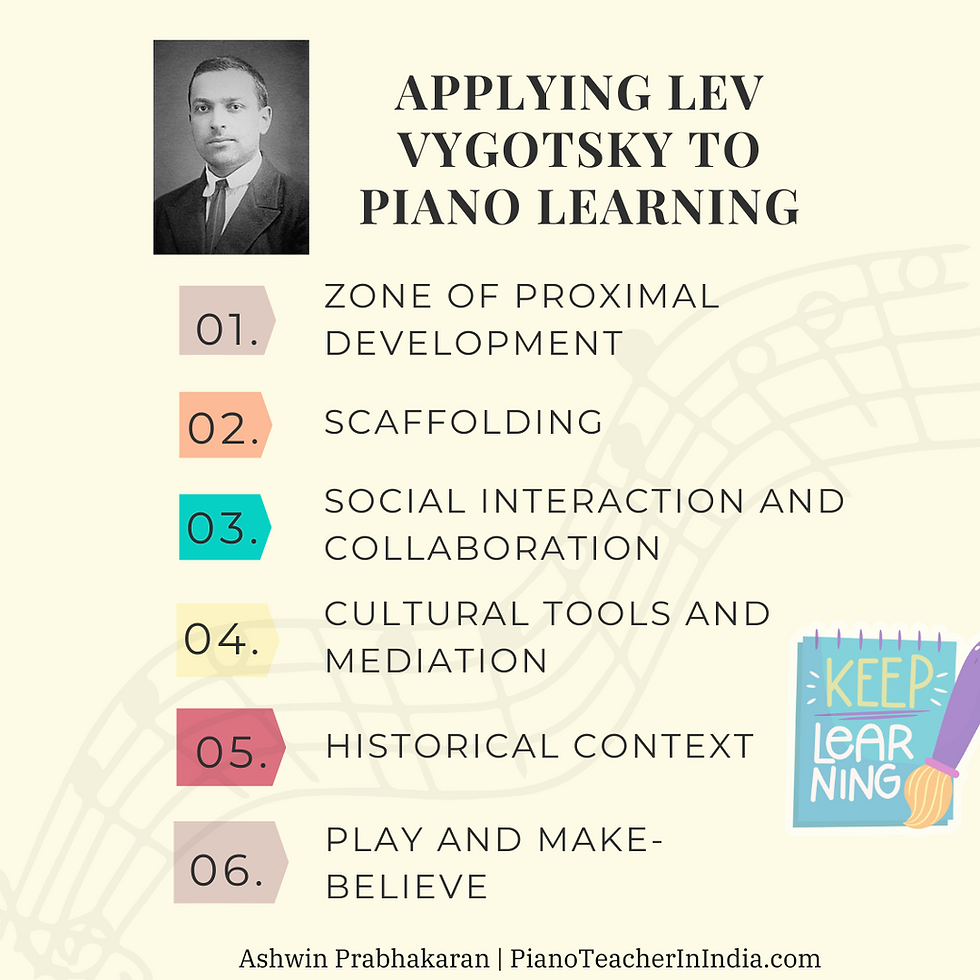Applying Lev Vygotsky to Piano Learning
- Ashwin Prabhakaran
- Sep 25, 2023
- 4 min read

Lev Vygotsky (1896-1934) was a Soviet psychologist and educational theorist who made significant contributions through his work on psychological development in children and creating the framework known as cultural-historical activity theory. His ideas have had a profound influence on educational practices and theories.
His major ideas include:
A - The Social Origin of Mind: Vygotsky believed that human mental and cognitive abilities are not biologically determined, but instead created and shaped by use of language and tools in the process of interacting and constructing the cultural and social environment.
B - The Importance of Mediation: He saw mediation as the key to human development, because it leads to the use of cultural tools and becomes a pathway for psychological development through the process of interiorization.
C - The Zone of Proximal Development: Vygotsky introduced the concept of the ZPD which refers to the gap between a child's current level of development and the level they are capable of reaching with tools provided by others with more knowledge.
D - The Significance of Play: Vygotsky viewed play as a crucial aspect of children's development, as the best sandbox to build and develop practice of mediation.
I will try to illurstate some of Vygotsky's into Piano Learning/Teaching examples.
1. Zone of Proximal Development (ZPD): Vygotsky's most well-known concept in pedagogy is the Zone of Proximal Development. The ZPD is the gap between what a leaner can do independently and what they can achieve with the guidance or assistance of a more knowledgeable person, often a teacher or peer.
Piano Teaching Illustration: If a student has just finished Grade L4evel of Piano Exam from one of the UK Boards, then a Piece such as 'Fur Elise' would be within the student's ZPD, where the student has sufficient skills to learn the piece, but would still require help to bridge the gaps required to learn this piece
2. Scaffolding: Vygotsky introduced the concept of scaffolding, which refers to the support and guidance provided by a more knowledgeable person to help a learner move through the ZPD. This support can take various forms, such as verbal cues, modeling, or structured activities. As the learner's competence increases, the scaffolding can be gradually reduced until they can perform the task independently.
Piano Teaching Illustration : For the above mentioned student, a kind of scaffolding that the teacher might provide would be to identify and learn the sections in order of difficulty.
3. Social Interaction and Collaboration: Vygotsky emphasized the importance of social interaction in the learning process. He believed that learning occurs through social interactions with others, such as teachers, peers, or parents. Collaborative activities and discussions are seen as opportunities for learners to develop higher-order thinking skills and internalize knowledge.
Piano Teaching Illustration : In the past, when I have Fur Elise to my Group students, I remember that the students ensured that they practiced the assigned parts so that they could play this piece with their friends, and they would help each other in parts that the other was finding difficult. The delight on their faces when they could play the piece as a Group was worth it, and I know that they will always play and remember this piece fondly because of the great memories associated with it!!!
4. Cultural Tools and Mediation: Vygotsky proposed that cultural tools, including language, symbols, and artifacts, mediate human cognitive development. These tools enable learners to acquire knowledge and skills and to communicate with others. Language, in particular, plays a crucial role in thought and learning, as it allows individuals to internalize external knowledge and make it their own.
Piano Teaching Illustration: In the above example of learning Fur Elise, when we came across the Diminished 7th Chord, we went into the rabbit hole of understanding the construction on the dim7th Chord, and figuring out the dim7th Chords starting on any Key, and even identifying dim7 Chords from pieces they had learnt earlier
5. Cultural-Historical Context: Vygotsky's theory acknowledges the significance of the cultural and historical context in which learning occurs. He argued that learning is deeply influenced by the cultural and societal norms, values, and practices of a given community. Therefore, educators should consider the cultural context when designing instructional strategies and materials.
Piano Teaching Illustration: This piece is a very good example of learning the cultural-historical context of Romantic Era : the drama, the use of pedal, the dynamic contrasts, etc, and how it relates/applies to other pieces by Beethoven and other composers of the same era
6. Play and Make-Believe: Vygotsky believed that play, especially make-believe or pretend play, is a critical context for cognitive development in early childhood. Through play, children can engage in imaginative thinking and problem-solving, which promotes the development of various cognitive skills.
Piano Teaching Illustration: With a different example this time. I have a student who is generally musical, but never practices. But when make piece into a game, ie make her learn one Section as a 'Call' and her classmate learn another part as a 'Response', she has always managed to learn the piece efficiently and quickly!!
Another
In summary, Lev Vygotsky's pedagogical theories emphasize the importance of social interaction, cultural context, and scaffolding in the learning process. His ideas have had a profound impact on educational practices, particularly in the development of educational strategies that support learners within their Zone of Proximal Development.


.jpeg)

Comments